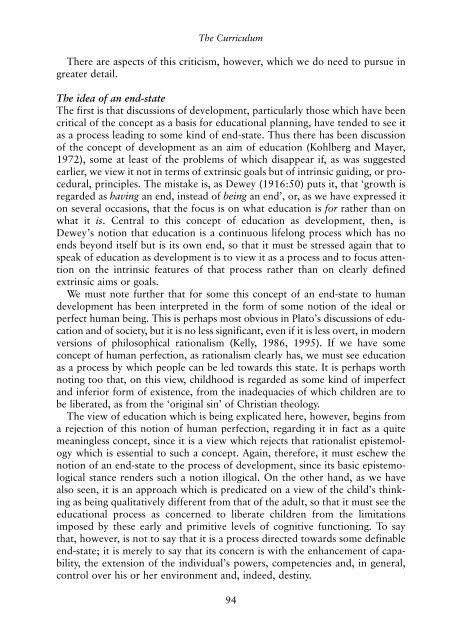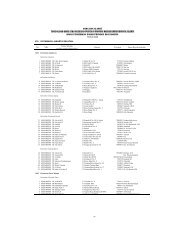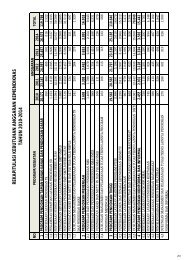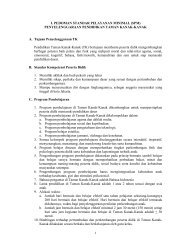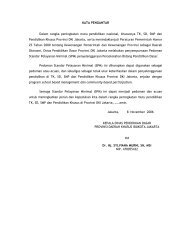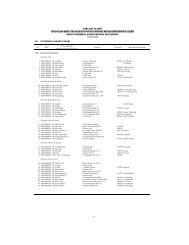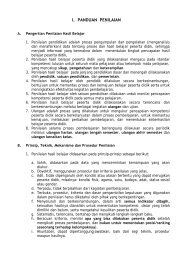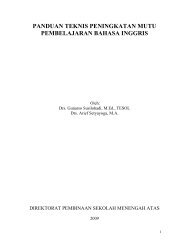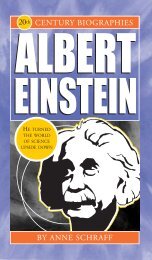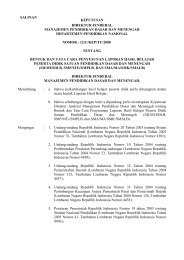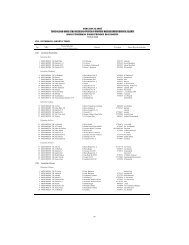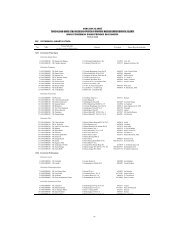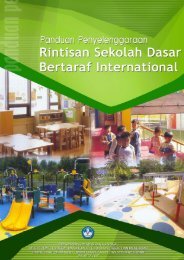The Curriculum - WordPress.com
The Curriculum - WordPress.com
The Curriculum - WordPress.com
Create successful ePaper yourself
Turn your PDF publications into a flip-book with our unique Google optimized e-Paper software.
<strong>The</strong> <strong>Curriculum</strong><strong>The</strong>re are aspects of this criticism, however, which we do need to pursue ingreater detail.<strong>The</strong> idea of an end-state<strong>The</strong> first is that discussions of development, particularly those which have beencritical of the concept as a basis for educational planning, have tended to see itas a process leading to some kind of end-state. Thus there has been discussionof the concept of development as an aim of education (Kohlberg and Mayer,1972), some at least of the problems of which disappear if, as was suggestedearlier, we view it not in terms of extrinsic goals but of intrinsic guiding, or procedural,principles. <strong>The</strong> mistake is, as Dewey (1916:50) puts it, that ‘growth isregarded as having an end, instead of being an end’, or, as we have expressed iton several occasions, that the focus is on what education is for rather than onwhat it is. Central to this concept of education as development, then, isDewey’s notion that education is a continuous lifelong process which has noends beyond itself but is its own end, so that it must be stressed again that tospeak of education as development is to view it as a process and to focus attentionon the intrinsic features of that process rather than on clearly definedextrinsic aims or goals.We must note further that for some this concept of an end-state to humandevelopment has been interpreted in the form of some notion of the ideal orperfect human being. This is perhaps most obvious in Plato’s discussions of educationand of society, but it is no less significant, even if it is less overt, in modernversions of philosophical rationalism (Kelly, 1986, 1995). If we have someconcept of human perfection, as rationalism clearly has, we must see educationas a process by which people can be led towards this state. It is perhaps worthnoting too that, on this view, childhood is regarded as some kind of imperfectand inferior form of existence, from the inadequacies of which children are tobe liberated, as from the ‘original sin’ of Christian theology.<strong>The</strong> view of education which is being explicated here, however, begins froma rejection of this notion of human perfection, regarding it in fact as a quitemeaningless concept, since it is a view which rejects that rationalist epistemologywhich is essential to such a concept. Again, therefore, it must eschew thenotion of an end-state to the process of development, since its basic epistemologicalstance renders such a notion illogical. On the other hand, as we havealso seen, it is an approach which is predicated on a view of the child’s thinkingas being qualitatively different from that of the adult, so that it must see theeducational process as concerned to liberate children from the limitationsimposed by these early and primitive levels of cognitive functioning. To saythat, however, is not to say that it is a process directed towards some definableend-state; it is merely to say that its concern is with the enhancement of capability,the extension of the individual’s powers, <strong>com</strong>petencies and, in general,control over his or her environment and, indeed, destiny.94


